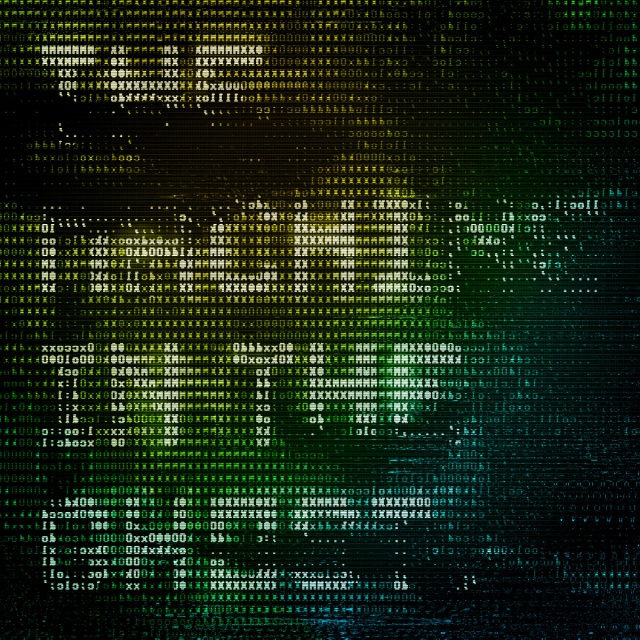Haujobb - The Machine in the Ghost

Reads: 1530 times
75%
Haujobb’s "The Machine in the Ghost", slated for release on September 20, 2024, marks a striking evolution in the duo’s already impressive legacy. Known for their refusal to tread familiar ground, Daniel Myer and Dejan Samardzic once again craft an album that defies the boundaries of electro-industrial music, blending the mechanical with the organic in ways that surprise and intrigue at every turn. This tenth studio offering is not merely another collection of songs; it is a statement of artistic intent, a meticulous exploration of sound that resonates with both conceptual depth and sonic mastery.
What immediately sets "The Machine in the Ghost" apart is its use of field recordings and unconventional instrumentation to weave a narrative that feels both deeply human and unsettlingly mechanical. The album’s sound design—ranging from the subtle to the abrasive—suggests a fusion of disparate elements that complement rather than conflict. In "Opposition", the inclusion of guest vocalist Emese Árvai-Illés (Black Nail Cabaret) is a brilliant stroke. Her voice, ghostly yet intimate, floats over the track like a haunting presence, adding an emotional depth that contrasts beautifully with the sharp, pulsating beats beneath. The decision to incorporate wordless singing, reminiscent of Eurythmics’ "Sweet Dreams", but imbued with the dark, cinematic flair of Massive Attack’s "Unfinished Sympathy", elevates the track to a standout moment on the album.
The collaborative spirit extends to other guest musicians as well. Hannes Rief (Die Selektion) introduces a melancholic trumpet line in "While It Rains", evoking a sense of noir-tinged melancholy amidst the cold industrial textures. Felix Gerlach’s cello on "Singularity" brings an unexpected warmth to the otherwise stark soundscape, while Aleta Welling’s lyrical contributions add layers of meaning that are felt more than understood.
Technically, "The Machine in the Ghost" exhibits a masterful balance between the tactile and the ephemeral. Haujobb employ both digital precision and tangible sound manipulation, merging software and physical objects into a sound that feels handcrafted yet futuristic. This creates an aesthetic that refuses to indulge in nostalgia for its own sake; rather, it draws from the past to reimagine the future. Tracks such as "In the Headlights" and "Uselessness" are emblematic of this approach, their meticulous structures revealing new depths with each listen, like watching light refract off a prism, shifting with every angle.
It’s this approach that has defined Haujobb since their early days in Bielefeld, when they first emerged with influences drawn from the Vancouver industrial scene—most notably Skinny Puppy and Front Line Assembly. The band’s trajectory, from their raw debut "Homes & Gardens" (1993) through groundbreaking albums like "Freeze Frame Reality" (1995) and "Solutions for a Small Planet" (1996), has always been one of transformation. Over the years, Haujobb has moved from the rigid frameworks of industrial music toward a more fluid amalgamation of electronic forms, incorporating elements of IDM, EBM, and ambient sound design. With "The Machine in the Ghost", they have reached a new apex in this evolutionary process.
Yet, despite its complexity, the album does not overwhelm. Each track serves a purpose in the broader narrative. "Uncanny Valley", with its unsettling layers and precise beats, sets the tone for the album’s exploration of the tension between the artificial and the authentic. "The Internation" pulses with a slow-burning energy, while "Mass Master" is an eerie, atmospheric descent into a world of sound both familiar and alien. The closing track, "While It Rains", with its lingering trumpet and sparse arrangement, leaves the listener suspended in a reflective space—a fitting end to an album that constantly plays with the boundaries of the known and the unknown.
The album’s production, handled by Myer and Samardzic, ensures that no element feels out of place. Every texture is considered, every note deliberate, and the final mastering by Frank Marheinike at Analog Mastering Studio in Frankfurt brings a richness that deepens the listener’s immersion. Visual artist Vlad McNeally's artwork and layout are the perfect accompaniment to the music, adding a visual narrative to the already rich audio experience.
"The Machine in the Ghost" is not just an album; it is an experience—a work of art that requires attention, patience, and introspection. Haujobb’s ability to blend emotional intensity with sonic experimentation is unparalleled, and this album stands as a proof of their continued relevance and innovation in a genre that too often becomes formulaic. With "The Machine in the Ghost", Haujobb demonstrate not only their technical prowess but also their unerring ability to stay ahead of the curve.
What immediately sets "The Machine in the Ghost" apart is its use of field recordings and unconventional instrumentation to weave a narrative that feels both deeply human and unsettlingly mechanical. The album’s sound design—ranging from the subtle to the abrasive—suggests a fusion of disparate elements that complement rather than conflict. In "Opposition", the inclusion of guest vocalist Emese Árvai-Illés (Black Nail Cabaret) is a brilliant stroke. Her voice, ghostly yet intimate, floats over the track like a haunting presence, adding an emotional depth that contrasts beautifully with the sharp, pulsating beats beneath. The decision to incorporate wordless singing, reminiscent of Eurythmics’ "Sweet Dreams", but imbued with the dark, cinematic flair of Massive Attack’s "Unfinished Sympathy", elevates the track to a standout moment on the album.
The collaborative spirit extends to other guest musicians as well. Hannes Rief (Die Selektion) introduces a melancholic trumpet line in "While It Rains", evoking a sense of noir-tinged melancholy amidst the cold industrial textures. Felix Gerlach’s cello on "Singularity" brings an unexpected warmth to the otherwise stark soundscape, while Aleta Welling’s lyrical contributions add layers of meaning that are felt more than understood.
Technically, "The Machine in the Ghost" exhibits a masterful balance between the tactile and the ephemeral. Haujobb employ both digital precision and tangible sound manipulation, merging software and physical objects into a sound that feels handcrafted yet futuristic. This creates an aesthetic that refuses to indulge in nostalgia for its own sake; rather, it draws from the past to reimagine the future. Tracks such as "In the Headlights" and "Uselessness" are emblematic of this approach, their meticulous structures revealing new depths with each listen, like watching light refract off a prism, shifting with every angle.
It’s this approach that has defined Haujobb since their early days in Bielefeld, when they first emerged with influences drawn from the Vancouver industrial scene—most notably Skinny Puppy and Front Line Assembly. The band’s trajectory, from their raw debut "Homes & Gardens" (1993) through groundbreaking albums like "Freeze Frame Reality" (1995) and "Solutions for a Small Planet" (1996), has always been one of transformation. Over the years, Haujobb has moved from the rigid frameworks of industrial music toward a more fluid amalgamation of electronic forms, incorporating elements of IDM, EBM, and ambient sound design. With "The Machine in the Ghost", they have reached a new apex in this evolutionary process.
Yet, despite its complexity, the album does not overwhelm. Each track serves a purpose in the broader narrative. "Uncanny Valley", with its unsettling layers and precise beats, sets the tone for the album’s exploration of the tension between the artificial and the authentic. "The Internation" pulses with a slow-burning energy, while "Mass Master" is an eerie, atmospheric descent into a world of sound both familiar and alien. The closing track, "While It Rains", with its lingering trumpet and sparse arrangement, leaves the listener suspended in a reflective space—a fitting end to an album that constantly plays with the boundaries of the known and the unknown.
The album’s production, handled by Myer and Samardzic, ensures that no element feels out of place. Every texture is considered, every note deliberate, and the final mastering by Frank Marheinike at Analog Mastering Studio in Frankfurt brings a richness that deepens the listener’s immersion. Visual artist Vlad McNeally's artwork and layout are the perfect accompaniment to the music, adding a visual narrative to the already rich audio experience.
"The Machine in the Ghost" is not just an album; it is an experience—a work of art that requires attention, patience, and introspection. Haujobb’s ability to blend emotional intensity with sonic experimentation is unparalleled, and this album stands as a proof of their continued relevance and innovation in a genre that too often becomes formulaic. With "The Machine in the Ghost", Haujobb demonstrate not only their technical prowess but also their unerring ability to stay ahead of the curve.
Release date: 20.09.2024
Label: Dependent
Tracklist:
1. Uncanny Valley
2. Uselessness
3. In the Headlights
4. Under the Gun
5. Tomorrow
6. The Internation
7. Opposition
8. Singularity
9. Mass Master
10. While It Rains
